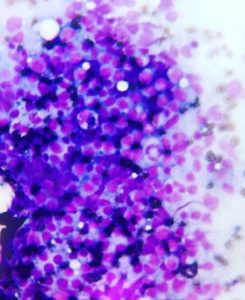We are delighted to offer medical oncology services for all types of cancer in dogs and cats.

Receiving a cancer diagnosis for your pet can be incredibly frightening and stressful.
It can seem like each new piece of information brings more questions than answers. At IVC, our primary focus is to get your pet as comfortable as possible, and to develop a personalized, effective treatment plan that is centered on your pet and your family’s specific treatment needs. Since every pet is different, every treatment plan is tailored to the individual receiving it.
How we approach oncology:
In most spaces (both human and veterinary), the language of oncology is the language of war.
We refer to new therapies as “new weapons in the war on cancer,” celebrate patients as “cancer fighters” or “cancer warriors,” and say things like, “she’s too strong to let cancer beat her,” “he’s never going to stop fighting,” and “cancer started this fight, but I will finish it”. We’re not wrong with this. For many patients, a cancer diagnosis represents the start of an internal war, and many draw comfort and hope from this analogy.

We have often considered what this analogy implies to patients who die of their cancer. For patients who “lose their fight”- could they have won if they were stronger or better soldiers? Are patients who enter palliative care “surrendering”? While of course the answer to these questions is no, they show the limitations of this cultural analogy. Any type of war has winning and losing sides, and significant pain and destruction occur along the way.
We practice oncology with the language of negotiation (or mediation) instead of war. Our patients are not soldiers in a larger battle—they are individuals. They are Charlie, Harley, Blue, Andrew, Rupert, Honey, Kip, Plumpkin, and many others. Together, we negotiate for optimal comfort and time. We talk about what trade-offs feel right and safe, and what are the most important factors to protect. Everyone’s paths and choices are different.
What will happen at my pet’s appointment?
When you and your pet arrive at IVC, please call the main number to check in. One of our client service coordinators will check you in for your appointment, and then one of our oncology nurses will talk with you in detail about your pet’s medical history.
You will then be brought to one of our consultation rooms, and your pet will come to the oncology area for a full physical examination. After that, you and one of our oncologists will talk about your pet’s condition, what we know about it so far, how to find out more information, and a few different options for next steps in your pet’s treatment.
We save a small number of same-day or next-day emergency consultation appointments for patients who are very sick, painful, or otherwise cannot wait for the next available appointment. For these appointments, your pet will need to drop off with us for the day, and one of our oncologists will call you once they have had a chance to examine your pet.
You will have the opportunity to ask plenty of questions, both at the appointment and afterwards if you think of them later. In most cases, it is possible to begin the next steps in your pet’s treatment at this initial visit, or you can think all of the options over before deciding on a long-term plan.
After your visit, we will prepare a visit summary for you, and we will send all of the records from your pet’s appointment to your primary care veterinarian.
What if I prefer palliative care for my pet?
If you already know that palliative (comfort) care is the best fit for your pet, we are here to help support you in this process. Oncology and palliative care often go hand in hand, and we enjoy helping our patients’ families find as many ways as possible to keep them comfortable and happy. It’s completely normal to come in for an oncology consultation if you plan to pursue palliative care.
IVC Oncology Resources:
Here are some resources that our oncology team has prepared that may be helpful to you. These are also linked on our Client Resources page.
- General Chemotherapy Information: This is a resource to answer some general questions about chemotherapy in dogs and cats.
- Chemotherapy and Bloodwork: This resource includes detailed explanations of why we check bloodwork before and after chemotherapy, as well as what (in general) the different numbers on the bloodwork can mean.